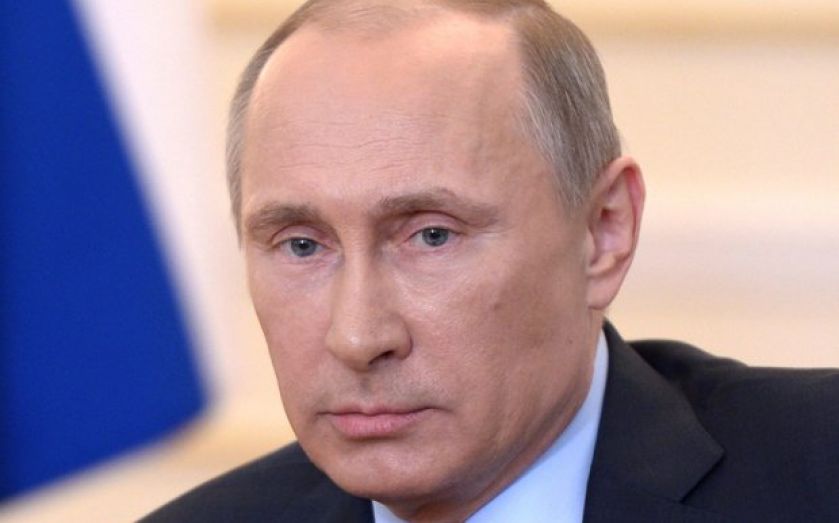Putin fears an EU fracking bonanza – but environmentalists don’t have to

RUSSIA and China agreed on a $400bn, 30-year deal last week, wherein Gazprom will deliver 38bn cubic metres of natural gas a year to China. This will exacerbate the EU energy crisis, but the bloc still seems intent on ignoring the only obvious solution – fracking – and fidgets at the margins with renewables.
Large parts of Europe are heavily dependent on gas imports from Russia: Finland, Lithuania and Bulgaria get all their gas, while it is the source for about 40 per cent of Germany’s supply. That is why EU leaders remain reluctant to impose sanctions on Russia, despite near-universal condemnation of its actions in Ukraine.
EU politicians talk about expanding renewable energies as a way of making Europe independent of Russian energy. Connie Hedegaard, European commissioner for climate action, said the Ukraine crisis should be a “wake-up call” for European countries to make the switch to renewable energy.
But this ignores reality. Europe gets just 1.3 per cent of its energy from solar and wind, about 75 per cent from fossil fuels and most of the remainder from nuclear. Even an extremely optimistic scenario from the International Energy Agency suggests that, by 2035, Europe will only be able to generate 8 per cent of its energy from these renewable sources.
Moreover, subsidising ever more green energy is becoming unaffordable. Spain is already paying more in subsidies to wind and solar than it spends on higher education. But perhaps the best illustration comes from Germany.
Last year alone, German consumers subsidised renewable energies to the tune of almost €20bn, contributing to an inflation-adjusted 80 per cent rise in household electricity prices since 2000. Yet the intermittency of renewables has increased the country’s reliance on fossil fuels since the nuclear phase-out of 2011. Moreover, the cost is becoming unbearable. As Spiegel pointed out: “Consumer advocates and aid organisations say the breaking point has already been reached. Today, more than 300,000 households a year are seeing their power shut off because of unpaid bills.”
Fortunately, there is a better way, but it requires the EU to rethink its fear of new technology and to look seriously at extracting shale gas. The EU has enough gas trapped in shale to free the bloc from reliance on Russian energy supplies for at least 28 years.
Fracking has attracted a host of environmental concerns, some valid enough to warrant regulation, but many exaggerated. Perhaps the most infamous is the much-viewed clip of a tap catching fire in the movie Gasland, which turned out to be spurious, as the gas was entirely natural in origin.
What climate-worried campaigners and technology-averse politicians fail to mention is that, with good regulation, shale gas will not only make us less dependent on Russia, but it is also this decade’s best solution to cutting CO2 emissions. The amazing truth is that fracking has succeeded where Kyoto and carbon taxes have failed. Due to the shale boom in the US, gas has replaced an unprecedented 10 percentage points of the much more polluting coal in electricity production. For 2012, when accounting for more wind energy and the economic crisis, the shift to gas has reduced CO2 emissions by about 300 megatonnes (Mt).
Compare this to the fact that all the wind turbines and solar panels in the world reduce CO2 emissions, at a maximum, by 275 Mt. The US shale gas revolution has, by itself, reduced global emissions by more than all the well-intentioned solar and wind in the world.
Moreover, the economic benefits of fracking are indisputable: as natural gas prices in the EU have doubled since 2000, US prices have fallen by about 75 per cent in the past few years. Annually, global solar and wind subsidies cost $60bn, whereas the US is making at least $100bn from cheaper energy.
As a way out of the Russian dilemma, some suggest importing liquefied natural gas from the US. Indeed, this appears to be on the table in negotiations over the US-EU free trade agreement. But wouldn’t it be more obvious for Europe to exploit its own resources? Even the European Commission, whose environmental agenda is strongly influenced by the precautionary principle, is now considering shale gas as a means of increasing the Union’s energy security.
The advantages of shale gas are many. A European fracking bonanza promises to reignite the crisis-ridden economy, with industries and consumers benefitting from cheaper gas prices. Moreover, it could be the biggest source of CO2 reductions this decade. Of course, fracking is not a silver bullet. In the long run, we need to switch to green energy. But as long as green technologies cost more than fossil fuels, this will never happen. Shale gas can help us reduce emissions while we focus on R&D to drive down the cost of future renewables.
Amusingly, Putin uses environmental arguments to dissuade Europe from exploiting shale. He even pushes an EU fracking ban, allegedly to safeguard the environment. If you frack, Putin said, “black stuff comes out of the tap.” In the meantime, Russia has massive fracking projects underway in Siberia.
Putin’s goal is to keep Europe dependent on Russia. We should not let him.
Bjorn Lomborg is director of the Copenhagen Consensus Center and adjunt professor at Copenhagen Business School.